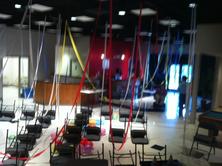 A couple years ago the National Center for Family Integrated Churches launched a survey on whether or not the "youth group" model was biblical. You can check out the survey itself here and a brief display of the results here. When they published their findings, they made the claim that the way churches engage and interact with students is the reason why >60% are uninvolved in their faith after adulthood. To all of us who read the article, we said "Duh." Not because of the model itself, but because of the source. NCFIC has been adamant since their founding to blow up not just youth groups but all age-graded ministry in the church. With their survey work, they found the "evidence" to confirm their platform. Here's the problem though, it didn't. Ed Stetzer, head of LifeWay Research offers his rebuttal on the research. I took the survey when it came out and knew exactly what NCFIC was looking for in their quest. So I wasn't at all surprised when the results were announced and we could now point the blame for a spiritually apathetic generation on churches, student ministers, and youth groups. As I read the articles that came out after the survey, I saw a lot of value in what NCFIC was trying to do, but have not and cannot go as far as they do to blow up the entire mission. Bad research leads to bad findings which leads to poor conclusions which leads to confused application. Ever noticed when Fox News and MSNBC do polls, they always seem to confirm the political leaning of the network? At the start is this survey is a poorly designed question structure. Short surveys aren't a problem, but asking 3 questions hardly gives a complete picture. Also, the phrasing of the possible answers does not allow for a divergence of opinion on the issue, and its strong wording on why youth groups are bad seem to show the bent of the designer. That's obvious in question 2! Neutrality in survey design is crucial to disavow any confirmation bias. The bad findings are that it's impossible to do any kind of real statistical analysis on the findings, except for a couple pie charts. Where is the interaction between the questions? If you cannot interact with the data except to show demographic results, it's hard to make any kind of conclusion or inference. It's also hard to develop a sound methodology without random sampling. The description from NCFIC was that they sent this via direct email to over 200K emails. Did those come from their database? If so, chances are a majority of those receiving the emails already confirm what NCFIC believes. Lastly, for such a controversial subject, allowing open-ended responses and categorizing those would have allowed for a very fluid picture of the perception of youth groups and young adult discipleship. Youth groups aren't necessarily the problem, but they are a symptom. There's no data or analysis to say that Youth Group vs. Family Integrated produces lasting discipleship and fruit, just speculation. It's simply impossible to quantify that in a survey. However, NCFIC is onto something when they bring up the problem of age group segregation. Even those who disagree with their assumptions would acknowledge that churches who pull families apart aren't helping the cause for lasting faith. It's a phenomenon we can observe across all of our culture though: we send kids as young as 5 away to school to learn from a state-funded teacher, we drop our kids off at individual batting sessions rather than the backyard, and we see fewer family meals together as busy schedules dominate our lives. What's happened in church life is a separation of families as soon as they walk in the door. Nursery and children's church aren't necessarily bad, except when they are used as a substitute for sharing the Gospel at home. There's a value in allowing the message to be heard, understood and applied at developmental level. I think you see that in Nehemiah 8 when all those who could understand are under Ezra's teaching. The answer isn't to blow up the ship, but to redesign it. Thankfully for years there's been a move to reclaim the home as the primary place of discipleship, and to recognize the biblical priority of parents (and especially fathers) to lead their families spiritually. I am indebted to Steve Wright, Timothy Jones and Randy Stinson for much of their work in developing a model of ministry called Family Equipping. Rather than blow up our churches' age-graded structure, I want to give 9 ways we can redesign them: 1. Make ministry to/with parents as great a priority as to children/youth - Parents are with their children and students way more than we are. The best investment we can make of our time is fewer events and more discipleship, especially with dads. Can you equip, encourage, support, and build their ministry at home? That's a bigger win than how many people came to your event. 2. Find ways to integrate your students with the life of the church - Help your students find ways they can serve in the church, as ushers or tech, greeters, nursery workers, or with cross-generation activities. 3. Recruit and train volunteers with gray hair - One response I often get from recruits is "I just don't know if I can relate or speak their language." To that I always say "Great! You're exactly who I'm looking for. They have enough idiots who speak their language and get on their level, they need someone who's walked with Jesus for decades to show them wisdom." When we recruit volunteers who are peers, we fail to surround them with men and women who can shepherd them and love them towards Christlikeness. 4. Be intentional about making disciples rather than a holding tank - In children's ministry you get about 7-8 years, and in student ministry you get anywhere from 5-7. When you think about it, that's not a long time. Spend your few years building a biblical worldview, point them to the Gospel, champion their parents, and give them a love for missions. That will do way more for their future and the Kingdom than filling seats. 5. Create an intentional pathway in your ministry structure from children-youth-college-adulthood - One reason I think a lot of young adults drop out is that there was no clear path towards the next step. After college they're expected to just figure it out without a structure to help them find a small group and continue to plug in. Managing these transitions is a way to build continuity not only with children/students but also among ministries. We often operate like silos, working apart but next to each other. 6. Place a renewed emphasis on men as spiritual leaders, and equip husbands and dads regularly - Ephesians 5 puts it right on the mark, Husbands and Dads bear ultimate responsibility for the home. Too often men's ministries in churches are outdoors expos or work crews, rather than the essential task of raising men of God who live with integrity, fight sin, protect their families, love their wives, and care for their children. 7. Change your scorecard and endgame from attracting and keeping to developing and sending - What do you define as a win in your ministry? Wins are what you aim for--for me I try to aim for producing mature disciples who we send out as missionaries to their college or their job after high school. Everything we do is built to generate those wins. 8. Churches should look for qualified men who can shepherd the age group - Changing the perception from youth guy to student pastor is a difficult one. We don't help ourselves out with the stereotype, but many churches look at the youth guy as a glorified babysitter. Many times I would interview at churches for a student ministry position only to be asked very superficial questions about personality, ideas for games, energy level and if I could be their "buddy." We don't build ourselves much a foundation when we settle for a Peter Pan, the youth minister who never grew up. Expect from your student pastor in many ways what you would from your lead pastor, and see if that doesn't change your church culture. 9. Churches should champion the next generation and expect a large number of church members to serve in those areas - There's no retirement in Christianity, just death. A church who is serious about reaching, engaging, and keeping the next generation should be willing to devote significant time, energy, and resources to that. One pastor I served under made it very clear: he expected every able-bodied church member who passed a background check to be on the nursery rotation. He saw how important it was to care for babies and minister to young families. Another way to do this is to simply expand your volunteer base. Recruit new volunteers every year for events, activities, camp and mission trips.
1 Comment
 This month back in 2007 I drove to Memphis to meet with a church that I'd been talking with for a few weeks. During that weekend I met with church leadership, the student ministry, and got a lay of the land. It all capped with a "trial sermon" where I shared my vision and dream for the student ministry. I was 25, inexperienced, and really hoping things went well (this was the position I'd prayed for so Carrie and I could finally live in the same city!) to start a new chapter in God's work in my life. Reflecting back on that 8 years later, there's so much I wish I could tell young dumb 25 year old me what 33 year old slightly-graying me has learned over the years. These 7 suggestions are more than that, I really believe these are helpful for anyone getting a start in student ministry. Hold tightly your convictions, loosely your methods - Your convictions are your deeply held beliefs that ground the philosophy of your ministry. Stick to those, because they are your rudder to keep your ministry going towards what God has called you to. For our student ministry, they have shaped our core values: We teach the Bible systematically, we raise leaders, we develop a culture of missions, and we build Gospel-focused relationships. Methods are how you get to your convictions, and those change. I think student ministry has an 18-month shelf life on methods. What worked 10 years ago probably won't work now. I saw that play out on a college campus, where free food wasn't enough to draw a crowd. I remember commenting that in 2000 when I was a college freshman you could've gotten me to show up to anything with food. Always evaluate the effectiveness of your methods. And don't love them enough that you keep doing the same thing and expect different results. Be open to change, and don't be scared to revise and change what you're doing--so long as your end game is the same. Be comfortable saying no - I wrote on this earlier. You can't do everything, be everywhere, or try everything. You have to know the difference between what's good and what's great, and be willing to say no to the good so you can say yes to the great. One pastor I served under said after his retirement "I wish I'd done less so I could have accomplished more." It also matters how you calendar and plan things, which is an important step in learning the difference between good and great. Pick your battles - Not everything is worth stirring up a stink for. Sometimes you have to let things slide and let time work its problems out. I have a few things I'll fight for: sound theology, purity, and missions. When The Shack came out, I came out strongly opposed to it because of its heretical portrayal of God. I remember the disappointment and some anger when I announced we'd no longer use NOOMA videos in our student ministry. Those were worth fighting over because there were major doctrinal elements involved. It's not always worth it though. I almost got fired for making a statement against teenage dating. Probably not worth fighting over in hindsight. So choose wisely, and lean on your parents, volunteers, and pastor for wisdom to know what's worth it and what's not. Be the champion for parents - "Mom and dad say I shouldn't listen to this CD, what do you think?" I remember that question clearly, and I remember my response as clear "As long as you live under their roof and they're paying your bills, do what they say. I'm not ever going to go against your parents, unless they want you sacrificing cats or something." Parents, especially of teenagers, do not have an easy job. You were a teenager once, remember all you put your parents through? Build a library of resources and communicate that to them regularly (I use our email newsletter to send links to articles on marriage, parenting, technology, trends, etc.), pray for them, and give them encouragement or affirmation. Support your pastor - Your pastor is dealing with stuff you can't even imagine. When you're over every ministry area, there's no one else to pass the buck to. Chances are he's fighting discouragement, he's stressed, and he's feeling overwhelmed. Make it a point to pray for him on a regular basis, and occasionally with him. Be his champion to critics. Don't even entertain gossip or dissension. And if you hear it, rebuke it. It won't be fun, but your pastor needs it. Be available to make hospital visits and the other daily activity in ministry. I did my doctoral work on the pastor/associate dynamic, and the healthiest and most effective leadership teams were the ones that had a solid foundation with the pastor. Keep reading - Finishing seminary isn't an excuse to quit reading. You need to keep yourself in the literature, attend professional growth experiences, and network. Find out what other student pastors and church leaders are reading, and keep sharpening your mind and heart to be a more effective pastor. Revisit the books you once read that really shaped you (Desiring God and Knowing God are two of mine), and ask your church if they would pay for you to subscribe to journals/magazines on student ministry (Youth Worker Journal is a great one). Remember to keep your family first - I'm going to be blunt. You're not that important to your church, your students, or your ministry calendar. You are that important to your spouse and kids. The church can always find another student minister, but your kids can't find another mom/dad, and your spouse can't replace you. Don't sacrifice your family on the altar of ministry. Two things I've learned to do on this are 1) Let my wife take the last look at the quarterly schedule, 2) Involve my boys in student ministry activities. I want my wife to see the schedule to catch any blind spots, over-extensions, or to catch any dates we may be double booked! And I want my boys involved because I want them to love ministry and see why Daddy does what he does--to tell the "Big Kids" about Jesus.  A few months ago I met with my student leadership team where we talked about one of the most important words a leader can learn: no. They were shocked when I told them "I say no to anywhere between 80%-90% of the ideas people give me. It's not that they're always bad ideas, sometimes they are, but it's because I don't want to stuff our ministry with things that don't advance the goal." Every leader needs to learn to say no, but I think it's especially important for student ministers. We consume ourselves with the false impression that busy = effective, so we program ourselves to death chasing after every event, mission trip, concert, and retreat. The reality is that in the end, we're exhausting ourselves, straining our church resources, placing an extra burden on our families, asking parents to over-extended their finances, and often spending way too much time doing stuff that doesn't matter. You're not Superman. Most student ministries are small and often find the student minister (and spouse) as the main volunteers. When we say yes to everything, we put ourselves and our spouses on a pace that we weren't meant to keep. One person can't manage all that's often asked of student ministers. That's why it's so important to develop a team of volunteers, and empower them to lead ministries. Here's the reality guys, you're not that important. Some things can happen without you. You don't have to be at every ball game, every class fellowship, every birthday party, etc. Empower and equip your volunteers and cheer for them when they do those things. It multiplies your ministry and allows you to focus on the priorities God has for you in ministry. You can't let everyone be a guest speaker. "God's given me a message to share with your students" is a phrase that sends a chill up my spine. I'm not saying every guest speaker is wacky, but there are plenty out there. And as the primary teacher/communicator, you have the responsibility to make sure that what's being taught and presented is biblical and edifying. You can't let anyone and everyone have your teaching spot. I use a rotation of a handful of guys I know and trust when I have to be away from our regular student ministry gatherings. I typically go over the plan with them and get feedback on what they're planning to do, but since there's a high level of trust it's never an issue. It's not always so rosy though, two of the better examples I've had to say no to are:
You can't do every activity that gets suggested. One thing we can never do in student ministry is let things get stale, where we keep doing the same things over and over again. Everything has a shelf life, and even good ideas can become golden calves if we're not careful. Soliciting ideas from others is a great way to generate new ministries and activities. But just because it's a good idea doesn't mean that it's something to incorporate into your ministry. Ask yourself four questions:
In the end, that's ok. You're not called to be everything. If you're serving in a small church with a small student ministry, you can't do all the things the megachurch across town can do. That's ok. Focus on the students God has given you and invest your life in them. And if you're in the megachurch, your time will be spent investing in leaders and volunteers more than in students. That's ok. Empower them to multiply the ministry. The point of this article is simple: be who God has called you to be, and do what God has called you to do. Learning to say no helps you keep your eyes on what's most important.  If I can be honest, one of the hardest things about student ministry is the "Dropout Effect." The dropout effect is what happens when students who had been a part of our ministry walks away from it, the church, or at worst their faith. The statistics are vague on how prevalent this is, depending on who you talk to it can be as low as 50% or as high as 90% (Kinnaman tags the number in You Lost Me at 59%). Because this is such a fluid topic, we'll suffice it to say that the number is "a lot." And for decades this has been an issue for churches to try to figure out how to retain young people. I believe this "Back Door" in the church is a gaping concern, and I also believe that it's impossible to point the blame at any one group in particular. Too often student ministers catch the brunt of this, where they are blamed for failing to stop a young adult from walking away from the church, but had watched their parents for years model a superficial commitment to the church. Or parents catch the blame for failing to raise their kids right, but watched a church burn out student ministers in succession or where the student minister was dismissed for moral failure. I believe the answer to closing the back door is to first look at the front door, and make some major commitments on the home and church side. Closing the back door is only going to happen when the front door and the time between is such that the back door can stay open and students don't want to leave. It requires both sides to recognize their important role in shaping young adults, and to make one fundamental shift in the common objective: Our goal is not raising children to adults, but to shepherd them to maturity in their faith See the shift? We're wanting to do more than simply graduate students to adulthood, but to develop a maturity in their faith. In this paradigm, the church and home work for a common purpose: the discipleship of a student towards maturity in Christ. Along with that come all the normal responsibilities and expectations of adulthood, but with a primary emphasis on their faith becoming the central aspect of their life. Here are the way how I believe the home and the church can close the back door by focusing on the front. Home - Shepherding Children & Students' Hearts 1. Parents should display a vibrant faith that has genuinely changed them - It's hard to ask from your child & student what you don't have yourself. So the starting place for this is for parents to look in the mirror and ask "Am I a Christian?" "Do I live out my faith in such a way that I show Christ?" "Does our home reflect what the Bible says about the family?" It starts by moms and dads recognizing their need for a Savior and leaning on Jesus for their salvation. More than a decision or prayer, it's reflected in everyday life. 2. Don't just parent, disciple - Discipling in the home is Good Parenting + Gospel. It doesn't mean that everything is over-spiritualized, but it does mean that discipline and punishment is an opportunity to talk about sin and consequences, restoration and forgiveness, and to ultimately point to Jesus who takes all our sin on Himself. It means the Bible is read, studied, cherished, and lived. It means parents are encouraging the spiritual growth of their family (and growing themselves!). 3. Keep the end-game in mind - I tell parents always to ask themselves 3 questions: "What do I want my child/student to Know?" "What do I want my child/student to Love?" "What do I want my child/student to Do?" The end game is the mature disciple produced after a faithful 18 years of loving care, shepherding, providing, and grace. Knowledge involves the shaping of a worldview (see #1 below), Love involves treasuring Christ and loving the Church, and Do involves living life on mission. Church - Partner with Parents to Provide an Environment for Faith to Thrive 1. Don't just teach Bible stories, develop a biblical worldview - We do a disservice to our children and students when we just give them Bible stories, even if they're really good stories. We have to make a commitment as teachers to develop a biblical worldview. That starts by seeing the Bible as One Story, one that is about a God who Creates, Man who Falls, Jesus who Saves, and Creation that's restored. Everything is about Jesus, and God is at work in every page of the Bible to show His Son. Next, a biblical worldview involves seeing life through that four-fold lens. A biblical worldview informs how we watch the news, read a book, drive our cars, and choose a career/spouse/house/car/etc. 2. Connect the generations, don't separate - If you're a youth leader, ask yourself one powerful question: If an 80 year old widow in your church died today, would any of your students miss her? Even notice? What happens so often in churches is the generations are pulled apart--either philosophically by separate programming emphasis, or physically by the design of the church facility. When we do that, we fail to put the full Body of Christ on display for our children and students. When we connect the generations, we allow for Titus 2 mentoring opportunities to happen (80% of young adults noted never having a spiritual mentor in their lives), we allow older generations to share their stories of walking with Jesus faithfully for decades, and we give children and students an opportunity to allow others into their world. 3. Provide opportunities for students & young adults to live out their faith on mission - When we build facilities that are designed to keep our students inside them and shelter them from the outside world, we do less to impact the world than we do to just build an ivory tower. It also reduces the "win" to just getting them in the door. Instead, embrace the mindset that sees how important it is to be on mission, where students are engaged with their communities and the world in sharing and serving Christ. One of my greatest convictions in student ministry is that every student should spend time serving outside of their context (different country or different region) once before they graduate high school. This gives them a love for their neighbor, a love for the nations, and a heart for serving that carries over long after the fog machines from camp are gone. What strategies have you seen work in your church and home for producing disciples?  Last night during the Monday Night Football pregame, the host asked the panel of former players about Johnny Manziel being the starting QB for the Browns. Trent Dilfer delivered in 90 seconds something that every parent, coach, teacher, and influencer in the life of children should hear. In 90 seconds he destroyed the entitlement mentality that many feel. The sad reality of the Manziel story is that the promising on-field talent will never be fully tapped because of off-field issues and poor decisions. For Dilfer, the blame doesn't rest solely on Manziel. Others are just as guilty. You can see the video clip here: Parents, here's 4 things you can do, regardless of how old your child is, to show that you love them. Love them enough to set boundaries - "Third tree!" is what I say to my son when he rides his bike on our driveway. We have four Bradford Pears (which are beautiful right now in the fall colors) that line our driveway. The reality is, the fourth tree is quite a bit away from the road, in fact it's a good 15-20 feet from our sidewalk! But the boundary is in place because we know the same thing every parent does: children find the boundary and try to push it just a little. Love them enough to say no - Saying yes and caving in is so much easier. It stops the incessant questions, it placates the tantrum, and it brings momentary relief. But it doesn't fix the problem. I love this article from Psychology Today that pointed out for French parents, the word no "rescues their children from the tyranny of their own desires." One way we show our kids how much we love them is we tell them no to things that might hurt them, be bad for them, or simply not be the best for them. Love them enough to discipline them - The sad part of the Manziel drama is that at any point, the responsible adult could have stopped things by holding him accountable and suspending him for games, grounding him as a teenager, or kicking him off the team. In every case though, the same thing happened: the grown-ups failed to act like grown-ups. Dilfer said it best: "Decisions have consequences." When we fail to discipline our children and hold them accountable, we actually do them a disservice. Love them enough to forgive them - If we discipline without restoration, we imprison. If we restore without discipline, we enable. When we do both, we redeem the child and show them a picture of what God has done with us. Mistakes happen, consequences must be dealt with, and sometimes you'll lose the car keys for a week. But on the other side of anytime you discipline, there needs to be the reminder of the wonderful love and grace we show because God showed it to us first.  Check out this ad from 1991 for Radio Shack (yes kids, that's where we went to get gadgets in the Dark Ages). Look at how everything in how we communicate, play, and share electronically has changed. What was once cutting edge is now on display in museums. One thing we cannot escape is that the way we do ministry is going to change. Twenty years ago in student ministry it was fueled by caffeine overnight trips, Red Rover, Chubby Bunny, and lock-ins. The way we connect with and invest in students has changed because times have changed, we've become more aware of the importance of safety, and we've recognized that lasting fruit happens when it's intentionally pursued. Making any change in student ministry needs to be something carefully thought out. I'm indebted to John Kotter from Harvard Business School for his work on leading change. His Eight Steps have proven invaluable to me over the years, and have formed the basis for how I lead change processes in student ministry. I've adapted some of his list, but here are some ways to go about leading change in your student ministry.  Have a "Dream Picture" - Kotter calls this a "strategic vision," which I've amended slightly. In the Dream Picture, you start with the end game at graduation by asking 3 questions: What do we want our students to know? What do we want them to love? What do we want them to do? These three questions help define what would be the Dream, an ideal student who graduates from our student ministry. Knowledge involves the forming of a biblical worldview, Love involves a growing and deepening faith, and Do involves missions and service within and outside the church. Build a Team - I'm intentional about who I bring in to help serve in our student ministry, because I want people who are team players, committed to serving, faithful in their church involvement, and who want to see great things happen. It's important to bring these people in to the Dream Picture and help them construct it. I often ask parents, grandparents, and young couples to serve in our student ministry so that we get a variety of perspectives. Also I think it's important to include in that team students who have proven themselves and have the maturity to get the big picture. Identify Roadblocks - When I first got to Westside, I made it very clear that we were going to make things intentional and we were going to have a plan. And that might include removing some things that didn't fit the plan. With your Team, work to identify any roadblocks in your ministry strategy, calendar, or philosophy that don't help you achieve the Dream Picture. It doesn't mean you make any change yet, it just means you've identified some areas to work through. Communicate Clearly with Parents - One of the biggest regrets I've had is that I wasn't more intentional about communicating change processes to parents. But they are the stakeholders in your ministry, not your students. They are the ones who trust you with their students. So anytime you make any change, you need to be clear in your communication. You also need to make sure that communication is two-way. Just giving information won't help win the change process, they need the opportunity to ask questions and give feedback. Sometimes they'll stop you from stepping on land mines! Be Ready for Pushback - Some of the things that you and your Team will identify as Roadblocks to the Dream Picture may be things your students love and are attached to. To prepare for this, you need to make sure you have talking points for your Team, trusted students you can enlist to help communicate, and some thick skin for any criticism you might get. Replace Losses with Gains - Whenever you remove a roadblock, it's going to be a loss for someone. The change process can go smoother when you are able to build in some wins/gains for students. One thing I said early on was no lock-ins, which is met with resistance every time I answer the question with the same answer. In order to replace that perceived loss, we build in late-night activities and I've asked those most resistant to removing lock-ins to help in the decision-making process. Work Slowly unless it's an Emergency - Leading any change process can be costly if it's done too quickly. Student ministry is no exception. I've followed a "1 Year" rule, that no roadblock will be removed for at least a year. This enables a new crop of students to come up who aren't emotionally attached, a chance for those who are to graduate, and a chance to work with the Team to develop the process and strategy. The exception is when it's a big deal that needs to be dealt with quickly. I've only done this twice. The first was create a process of financial management because our snack bar was unchecked. The second was to remove from our student ministry library the NOOMA videos by Rob Bell because of some heretical views he had taken towards salvation. Enlist your senior pastor and children's minister - The two biggest allies for a student minister are the lead pastor and the children's minister. One is your mouthpiece to the entire church, the other is your feeder for your ministry. Any significant change process you do needs to be something they are both aware of and on board with. It's good to have your lead pastor in the discussion because you want to make sure your ministry strategy and philosophy is lining up with his direction for the church, and so your children's minister can help you lead the transition to student ministry. Cheer for Change - One major change I did recently was move our camp, from one 4 hours away to one 30 minutes away. Every chance I got I took time to hype up what the new camp had to offer, how much bigger it was, and how many more friendships our students could make. I also took time to talk to a number of parents about it who quickly became cheerleaders for it. And the message was always communicated in a way that reinforced how this change was for the best and how it helped us achieve our Dream Picture. What ways have you worked to make change in your student ministry that you'd like to share? When I was a kid I remember staying with some relatives who were very devout Christians, and while we were with them we had to go to church one Sunday. I was asking my aunt about the day and she said it would start with Sunday School, and then we’d go to “Big Church.” My spoon fell at the word “school,” and I responded with something along the lines of “We go to school all week, and God wants us to go on Sunday too?”
In God’s sense of humor I later became a Christian who eagerly attended Sunday School as a high schooler, and eventually became a Sunday School teacher. Even though I serve full-time as a student pastor, teaching Sunday School has been something I’ve held onto until very recently, despite the added administrative, teaching, and visitation responsibilities. What began in the 1700s as a way to educate street children who spent all week working in the factories in the early days of the Industrial Revolution has now become an institutional staple in our churches. It can go by different names: Sunday School, Cel Groups, Core Teams, Bible Fellowship, Discover the Bible, etc. but the core remains: a small group of people gathered to study the Word. I believe Sunday School remains a key component to building a strong, healthy, and spiritually productive student ministry for 4 reasons. It provides fellowship - However you arrange your groups (age, grade, gender, division, etc.), they provide natural affinity groups for your students to be around those in similar circumstances. Take advantage of this, many in your class may attend the same school. Work towards building a supportive community where they are allies on their campus, extend the relationships beyond church time. Teachers, have your class in your home, do things with them. My wife and I had the same class for 4 years now and it was one of our great joys to pour into that group. It becomes the primary teaching arm of the ministry - For many students, this is the point at which they are most connected to the Word. Most pastors, though well-meaning, struggle at times to really connect with teenagers. Take full advantage of this in selecting and evaluating a curriculum. Pick one that does more than offer the best icebreaker. Go with one that really captures the big picture of the Bible, that centers itself on the Gospel, and that provides cultural engagement. A couple great recommendations are The Gospel Project by LifeWay, and Treasuring Christ from Life Bible Study. Good teachers are worth their weight in gold - I have always been very selective in who I ask to teach in our student ministry. I look for people who are committed to the church, who are perhaps serving in another ministry, who have a healthy Christ-centered marriage, and who seem to have a passion for both the Bible and ministering to students. Recruit well, because it is very hard and costly to dismiss a volunteer. At the same time, invest in your teachers. Keep them in the loop with information. Have fun with them. You as a student pastor are your teacher’s small group leader, so invest in them. Minister to them. Love them, serve them, and they will be your eyes and ears. I regularly ask our teachers if there are needs coming up in class, and we try to be in constant dialogue about ministry needs, curriculum, evaluation, and training. Good teachers can be taught, so make sure to train them well. We take an afternoon once a year (would love to do more) and work through some issue related to teaching, so far we’ve done transformational teaching and developing learning activities. It becomes the front door for a student ministry - No matter how cool your mid-week ministry is, Sunday School still serves as the best front door for your ministry. This is the opportunity for visitors, prospects, and new-to-towners to gather with their peers and begin the process of assimilation. Our goal with Wednesday night when we have guests is to introduce them to people in their Sunday School class and encourage them to come and attend the following Sunday. We’ve seen it repeatedly, students who assimilate and who become connected are students who stay, grow, mature, and serve. Sunday School classes also provide the opportunity to contact those who have dropped away, who are in need of accountability, and who need encouragement. These are all things that are hard to do on a macro level but which can be done on a micro level.  I hate surprises. Like, a lot. I had a surprise party once and the only thing I could when I came in was look around and stare at it. It's not that I didn't like it, I did. To be honest it was one of the coolest things someone has done for me. It was that I wasn't ready for an entire room decorated for me. Surprises throw me off because they're unexpected. And since I'm a bit of a control freak, the unexpected is scary. To get around that I try to plan as much as I can, what my day, week and month is going to look like. It's not perfect and it doesn't always work out like I hoped, but it's been a really helpful practice. One way to plan in student ministry is to calendar. When we calendar we're putting some intentionality behind what we do. If you have a set of core values, use those when calendaring. Try to make sure everything you do fits in those. Our core values are an unapologetic commitment to the Bible, a climate of Gospel-focused relationships, a catalyst for raising up leaders, and a concern for missions to our neighbors and to the nations. Everything we do fits in one of those core values--there's no room or time for doing things for the sake of doing them. Practically speaking, here are five guidelines for developing your student ministry calendar: Plan realistically ahead - It's awesome to try to develop a detailed calendar a year in advance, but it's often not helpful. Realistically planning means marking down your major, bedrock dates (camp, mission trips, retreats) and working 3-6 months ahead on everything else. On those calendars, work a quarter ahead. For example, you should now be drafting your spring 2016 calendar and brainstorming your summer 2016. Keep costs in mind - Parents often have to foot the bill for at least part of their students' participation. Be wise with how you ask them to spend their hard-earned money. Keep some of your activities close to home or on the cheap, and leave the big time things for a couple times a year. You also have to keep costs in mind because your church has a tight budget. Forward planning with costs in mind is a great way to keep your stewardship team happy with you! Make missions a priority - So many student ministries get the label as a holding tank because they never do anything to make a difference. As a student minister, lead them to serve, and put it on the calendar. We try to do at least 6 missions experiences each year, as near as our church parking lot on Halloweeen and as far away as we can go.  Communicate any changes - As much as we try to plan and forecast, things happen. You get sick, the school hosts a major event, you get a freak snow storm, or the signup for an event tanks. In any case, you need to be flexible that changes will happen and communicate that to your students and to their parents as quickly and often as possible. Don't rely on word-of-mouth, use email, social media, announcements, and if possible phone calls or personal contact. Anytime you have to make a change, have a backup plan! Have fun! - We try to do things so our students can have unique experiences before they graduate high school. So plan things that they want to come to and be a part of. Remember, it's not your job to entertain them or babysit them. You have a unique position to lead them in some cool things--so go skiing, whitewater rafting, to a MLB game, or play kickball in a park.  God doesn't need a backup plan, but we do. That lesson was so obvious to me about a year ago when we took a youth trip to Nashville for a day serving and hanging out at Opry Mills. Let me rephrase that, we were supposed to spend the day in Nashville. But thanks to a serpentine belt breaking and a dead van battery we ended up spending most of our day at the Tennessee welcome center while waiting for repairs to get everyone home. Caught without tools, a contingency plan, or any Coke Zero, we had to wing everything that day. Luckily we had great adult leaders on the trip who were able to diffuse any tension, help shuttle students, and work on the van stuck on the side of the road. Everything God sets out to do will happen just as He intended and wanted it to. That's because He's sovereign over everything, including the stuff we don't see or plan on. But since we're not God, we can't plan on everything so we need a backup plan. Here's 4 reasons why a backup plan is important for student ministry: You can't control the weather - This is the most obvious but often the most overlooked. If you're a student ministry leader doing anything outdoors you need a rain plan. You can't control who you're working with - We took a huge group on a mission trip and the ministry we worked with ran out of ideas for us after a couple hours. It's important to have contingency plans in place in case they have too much for you or too little. We took that day and prayer walked the main place they minister, and found the nearest Sonic.  You can't control your health - If a ministry activity or event can't happen without you there, you're doing it wrong. Always recruit other leaders, parents, and others in the church to help carry the load of organizing and executing an activity. Last year I had heart surgery and the only time they could do it was right when our student ministry was supposed to have a Christmas party. Rather than cancel, some adults stepped up to handle the logistics and plan for the night. You can't control your numbers - If you regularly work with young adults, you know how useless sign up sheets are. Having a backup plan for numbers means keeping additional drivers and adults "on call" just in case they're needed, or to have a plan in case fewer show than expected. One way to help in this is to come up with a minimum number of students committed for an event or activity to make. You can't stop Wally World - Remember that scene when the Griswolds arrive at Wally World only to find out it was closed? Yeah. That's happened to all of us in student ministry. Rather than take security guards hostage and forcing your way into a closed situation, find the nearest park, mall, Sonic, or ball field. What other reasons do you have for needing a backup plan in student ministry?  Ever heard of the app TimeHop? It's an app that uses your social media history (Facebook, Twitter, Instagram) and shows you each day what you said/posted that day a year ago, two years ago, and back. Carrie and I love it because we can look back at pictures of the boys and marvel at how quickly they're growing up, we can see what we were doing while we were dating and engaged by the pictures we post, and we can laugh at the long journey we both took for doctoral work. TimeHop can teach us a few things about student ministry, both good and bad: 1) The past is great to remember, but terrible to live in - TimeHop gives us a glimpse into the past and allows us to relive the memories of newborn babies, the first months of marriage, graduation, and other important events. But those events have come and gone, and we can't try to live the "glory days" like The Boss sings about. For us in student ministry, we need to remember and cherish the memories of past camps, events, and spiritual milestones. But we can't do that at the expense of the crop of middle schoolers desperate to hear from God's Word. A lot of our students are learning to drive now, and one of the first things to teach a new driver is to glance at the rear-view mirror but focus on where you're going. 2) God has used you before, and will again - When we see TimeHop, we see really cool things that have happened before. We get to see the early days of our oldest learning to walk and talk, and we get to celebrate past things that we went through that were really special. For us in student ministry, looking back in the past is a great way to remember how God used us before. And Philippians 1:3 tells us that when God begins a work in us, He'll see it through to the end. We can claim and rest in the fact that God used us before and He's going to again. This past summer we took a group on a mission trip and some on the team had been the previous year. They got to watch (like I did) as the week unfolded and the connections were made and the Gospel was preached and hope was built into siding and roofs and decks and paint. 3) You're making a difference - Someone said they saw me mowing my yard the other day and I explained to them how helpful it is as a stress relief (I can mow it and see progress and when the job is done I can drink some water, get a shower, and admire the finished product). So often in student ministry the results don't get noticed for years, until they're a college student and they realize how important their faith is, or they get married and make the commitment to build a godly legacy. Until then the hyperactive and somewhat distracted nature of middle and high school makes you wonder if you'd rather talk to the wall because it listens better. A few months ago I saw a group picture of the first short-term mission trip we took with our students. Most of them are graduated and moved on, and looking at that picture I saw how the course of the last 6+ years shaped them for the rest of their lives. 4) What you say leaves a forever digital footprint - In ministry, the most important role is that of teacher/preacher, and we use words as our currency in that role. What we say has a huge impact, whether we actually said it or not! Matthew 12:36-37 reminds us that we will have to give an account for every word we say. That's why James says it's not for everyone to be a teacher! In student ministry, we need to remember that the words we say and the way we say them matters. |
Scott M. DouglasA blog about leadership and the lasting legacy of family ministry. Archives
August 2023
Categories
All
|

 RSS Feed
RSS Feed



